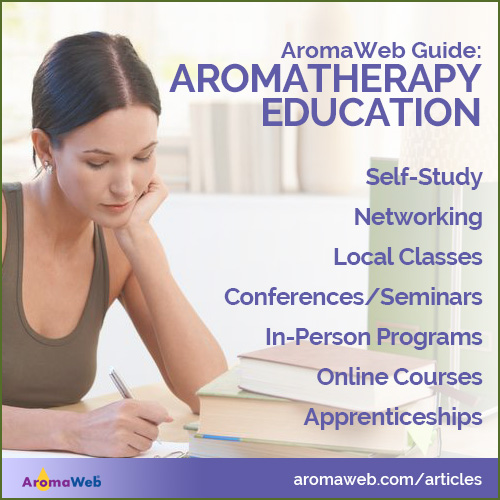Aromatherapy Education

Many exciting opportunities exist for increasing your knowledge about aromatherapy. From basic self-study for introducing aromatherapy into your personal lifestyle to the most comprehensive of distant learning programs and aromatherapy certification, there are quite a few options to suit your needs. This article covers a variety of these options including self-study, networking, local classes, seminars, distance learning and apprentice work.
Quick Page Links:
Self-study • Networking
• Local Classes • Conferences/Seminars
Comprehensive Online Aromatherapy Courses • Apprenticeships
Also Visit AromaWeb's Educator & School Directory
Self-Study

The most common way for individuals to begin expanding their aromatherapy knowledge is by self-study. Self study involves reading a variety of the many aromatherapy books and Web sites that are available, absorbing the information they contain, and by personally utilizing the information they have learned. Some individuals take self-study further by creating a serious personal lesson plan that includes memorizing, comparing and researching the information that is available to them. Self-study is a wonderful method to use to begin introducing aromatherapy into your lifestyle. Many aromatherapy books on the market are "recipe-style" books that contain recipes for aromatherapy blends that the reader simply prepares much like a food recipe. Some "recipe-style" books do contain solid safety information and other relevant information, but they only touch the surface. For the serious student of aromatherapy, however, it is important to learn detailed information about each oil (botanical name, safety data, contraindications, detailed aroma profile, etc.), anatomy information, the chemistry of essential oils, safety information, techniques for therapeutic and aromatic blending and the list does go on. Self-study will not teach you everything that you must and should know to move forward in an aromatherapy career path. Adly, there is a growing number of books being published that contain inaccurate, unsafe or ineffective information about essential oils. When pursuing self study, be sure to be learing and referring only to reliable books published by reputable eductors. For more information and help, explore AromaWeb's Guide to What to Look for When Shopping for Essential Oil Books.
Networking
Networking involves exchanging your aromatherapy knowledge and experiences with others. Networking can occur anywhere and can include your interactions on facebook, twitter or via blogs. Always remember, however, that people usually have great intentions, but sometimes the information that is supplied isn't safe or accurate. It's important not to blindly believe what you are told and to first explore and verify the credentials and knowledge of the individuals that you are networking with.
Local Classes
Aromatherapy classes spring up everywhere from community classes offered through local school districts to more in-depth aromatherapy classes that are offered by qualified aromatherapy educators. Local aromatherapy classes can vary greatly in what they teach. The educational and professional background of the instructors can also vary greatly. Some classes are just a couple hours long and teach you very introductory information. Some give you a handbook and allow you to make a couple recipes during the time of the class. Some give detailed safety information, but some don't. If considering taking a local class or course, consider asking the following questions: Who is the instructor? What is his/her formal aromatherapy educational and general aromatherapy background? Where did he/she receive her education/training? Is the educator or course tied to a specific brand of essential oils? Is he/she a member of an aromatherapy association like the Alliance of International Aromatherapists or the National Association for Holistic Aromatherapy? What exactly will be covered in the class? What safety information will be covered? What materials will I be given as a part of this class? Like with self-study, most local classes offered through a public school district or in connection with a wellness store will not teach you everything that you must and should know to move forward in an aromatherapy career path.
Conferences, Seminars and Webinars
Well recognized aromatherapy organizations such as the Alliance of International Aromatherapists (AIA) or the National Association for Holistic Aromatherapy (NAHA) here in the U.S. offer bi-annual educational conferences that last several days and include approximately 20-25 hours of educational aromatherapy presentations from a wide range of educators and authors. I've attended NAHA and AIA conferences and generally find myself so profoundly enriched by the experience. Seminars range from half-day to several-day aromatherapy events. In some cases, seminars are sponsored and held by local aromatherapy businesses and a well-respected aromatherapist provides the instruction. In other cases, a local aromatherapist or store owner acts as instructor. Webinars are a web-based seminar or presentation that allows individuals to attend, regardless of physical location. NAHA and AIA, for example, offer monthly webinars for their members. As with local classes, seminars can vary greatly in what they teach and cover. Please refer to the above section on Local Classes for helpful tips on what questions to ask before signing up for an aromatherapy seminar.
Comprehensive Aromatherapy Programs and Courses In-Person and via Distance Learning
There are a number of reputable schools that offer comprehensive aromatherapy classes and aromatherapy certification at their school facilities. Because on-site attendance can be impossible for those living far away, numerous schools and educators offer online and distance learning programs that can lead to aromatherapy certification. Distance learning courses offer the student the ability to learn a comprehensive aromatherapy curriculum, usually at the student's own pace. Visit AromaWeb's Educator & School Directory for the listings of fine educators offering aromatherapy certification and other essential oil classes and programs. Also visit the Alliance of International Aromatherapists List of Recognized Schools and the National Association for Holistic Aromatherapy List of Approved Schools.
The credential earned after successful completion of a course is usually a certificate or diploma in aromatherapy. The quality, depth and insight contained within the lesson materials and the responsiveness of the staff for such institutions can vary. Don't hesitate to ask questions of the institutions you are considering before making your final decision. It is important to request a sample lesson, detailed overview (syllabus) of the course, the name and detailed qualifications of the head of the institution and your instructor, exact details on how each lesson is graded and details of all materials.
If possible, talk directly to the individual that will be your instructor or tutor. If you both will be in touch mostly by webcam or phone, make sure this individual is relatively easy to reach for those times that you will have questions. If you will be mostly corresponding via e-mail, make sure that he/she responds in a timely and clear manner via e-mail.
Special Note about Aromatherapy Certification in the United States
I receive quite a few e-mails from visitors asking how to get certified as an aromatherapist. Each state grants licenses and certifications for those in various "hands-on" fields that can include such professions as nursing, cosmetology and massage. Each state differs in its licensing requirements, and some states do not require a license to touch a client. It is my understanding at the time of this writing that there are no states in the U.S. that currently grant licenses/certifications to individuals for the use of the title of certified aromatherapist. Some states, perhaps most states, require that an individual has a license (certification) in a hands-on field before a client can be touched. It is crucial to find out the laws and regulations of your particular state.
What is offered by aromatherapy educational institutions is usually aromatherapy certification in the form of a certificate in aromatherapy or a diploma in aromatherapy. A diploma in aromatherapy course is usually a more advanced course than that of a certificate in aromatherapy course, but do verify as I've seen some concerning schools offering "diplomas" that seemed a bit questionable to me. Receipt of a certificate or diploma is different than being certified or licensed by your state. Again, there are no states that I am aware of that offer a license or certification specifically for aromatherapy. Since there will be differences between schools and courses, it is important that you inquire specifically with the school to find out the details of the course offerings and what it will qualify you legally to do after graduation.
A U.S. non-profit registration body, The Aromatherapy Registration Council, provides a registry of aromatherapy practitioners that successfully pass a national aromatherapy exam. The ability to assess and verify a practitioner's level of knowledge is a tremendous benefit to the aromatherapy industry. The ARC, however, has not met with complete support within the aromatherapy industry, and opinions on the benefit over taking this exam and the registry are still quite varied. Time will tell if the registry will become a widely recognized and valuable way of assessing one's aromatherapy knowledge.
State Licensing of Schools
In the U.S., there is added confusion because an educational institution teaching aromatherapy can be certified or state licensed to be an educational institution, meaning that they have to pass certain criteria to meet their state's licensing standards. This, however, does not mean that you are automatically certified or licensed in your state after successful completion of the course. Some states require that schools that offer distance learning programs are licensed with the state, others do not. It does not necessarily reflect poorly on a school if it is not state licensed. It may just mean the school isn't required to be licensed in the state of operation but it also may mean that the school doesn't supply the same benefits that a licensed school in another state provides. A red flag, however, should go up if a school is required to be licensed in the state of operation but isn't.
Choosing to enroll in a state licensed institution does offer certain advantages over choosing to enroll in a non-state licensed school, and these benefits may vary depending on the state the school is located in. As each state can differ in its licensing requirements, you may wish to first find out from the school if they are state licensed and then check with the state Department of Education that the school is located in to find out (1) if the school is indeed licensed, (2) if the school is required to be licensed, (3) what benefits licensing offers in that state, (4) if there are any complaints filed against the school, (5) if there are any other concerning notations in the school's file and (6) what standards has the school had to meet to become licensed.
Graduate Liability Insurance
If you choose to become educated in aromatherapy so that you may consult with clients after graduation, it is wise to ask the schools you are considering if they have any relationships with an insurance provider for the benefit of their graduates. If so, ask for the name(s) and contact information about the provider(s), give each a call and confirm that they do insure successful graduates of the schools that you are considering. Without proper liability insurance, you will put yourself and your clients at risk. During selection of a school is the time to ensure that you can obtain suitable insurance through a reputable company after graduation.
Apprentice Type Opportunities
Last but not least, there is a possibility of gaining valuable aromatherapy knowledge and experience by becoming an apprentice with your local aromatherapist, aromatherapy store, herbalist, essential oil distiller, etc. These positions usually are not paid, or the salary is minimal. The true value of such a position is the added hands-on education that you receive. Naturally, the opportunities depend on where you live, the number and type of aromatherapy establishments that exist in your area, and the availability of open apprentice positions. Networking with others (see the above section on Networking) can help offer leads on where you might be able to find apprentice positions. Since you will be working hard and your compensation will be the amount and quality of aromatherapy education and experience that you will receive, it is important that you ask the right questions during your interviews. It's important to find out exactly who you would be working with, what you would be doing, and what the detailed backgrounds are (including educational background) of those you would be working with. Be leery of an organization that is not respectful of your asking these questions or hesitates in answering or elaborating.

